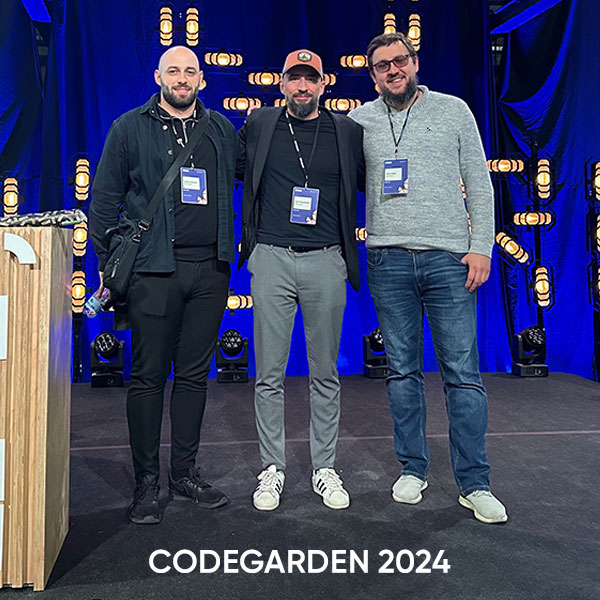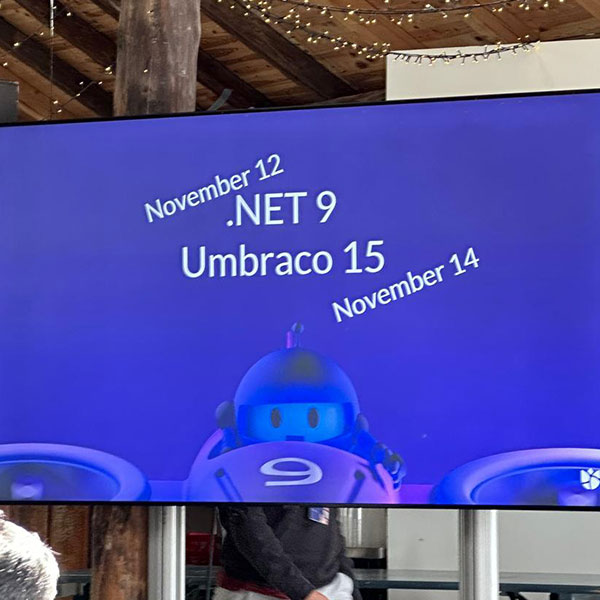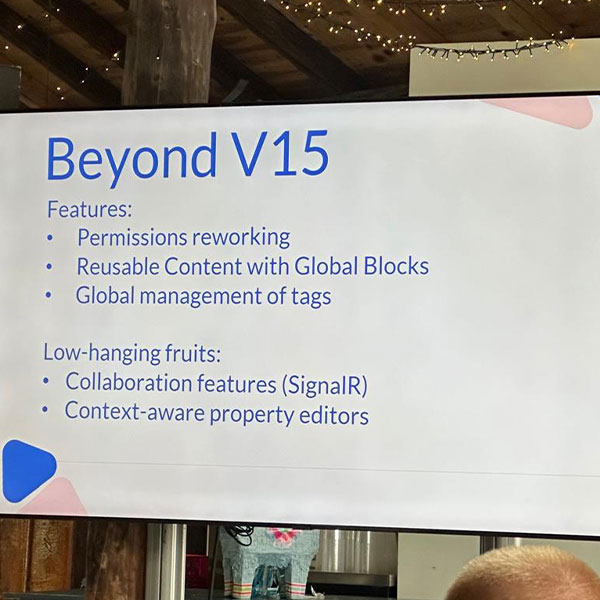Codegarden's attractions, ranging from detailed talks about API controllers to surprise performances by the marching band, were so stimulating that the program even included meditation sessions to help ease the mind. While we couldn't participate in everything, we gathered the key insights for you.
For Umbraco, talking about the Umbraco Community is like doing victory laps at this point, so it's no wonder this topic kicked off the conference during the Keynote Speech.
"We are already in every place on Earth except the Arctic," the Director of Developer Relations Emma Burstow praised the Community Members. Community Teams have grown so much that they now require their own taxonomy. They are divided into teams, guilds, and advisory boards, each focusing on disciplines such as cloud, sustainability, AI, security, and privacy.
Of course, Umbraco itself has developed just as dynamically. According to Filip Bech-Larsen, the company's CTO, a new project using Umbraco appears on average every hour.
The increase in the popularity of generative AI is expected to boost the amount of web content, driving demand for flexible content management tools. The reasons for choosing Umbraco are still strong: for another year in a row, user reviews on G2 show excellent ratings, almost outclassing most competing systems. Umbraco also offers a rapid ROI due to the convenience and ease of building new solutions within the system. "Build how you want to build" remains the motto here.
KEYNOTE CLIPPINGS
The keynote speech was a delightful blend of pride, vision, and ambition. Speakers guided us through short presentations about Umbraco's latest modernizations.
We've learned more about Project Insights, a dashboard that simplifies project management across development, staging, and production phases in a single interface. It provides constant CPU usage indications and meticulous system error reporting.

The sustainability dashboard's honest presentation underlined that environmental concerns are not merely PR but a foundational pillar. "You cannot be accused of greenwashing if you are fully transparent about your methodology; at most, you can be wrong," was the motto of this presentation. In line with this idea, digital projects showed us the rules behind calculating CO2 consumption. Currently, these calculations are based on the energy consumption of the computing infrastructure. With upgrades, they shall become even more accurate, considering factors such as database operations and storage.
WHAT'S COOKING WITH UMBRACO 13 AND 14
Two new editions of Umbraco have been released since the last Codegarden, both using the latest version of .NET 8. The main theme of versions thirteen and fourteen is saying goodbye to legacy technology and outdated solutions. In version 13.3, the ability to use content blocks directly in rich text editors will finally put macros to rest. The new Umbraco 14 backoffice, as we have already written about, has eliminated old JavaScript dependencies, freeing developers from being tied to any specific framework when creating extensions and integrations.

We recently devoted a blog post explaining whether consumers should choose Umbraco 13 or 14 today and the differences between the LTS and STS versions. The hosts of one session, Bjarke Berg, Head of CMS, and Elitsa Marinovska, Software Developer from Umbraco HQ, put it neatly using a kitchen metaphor: Umbraco 13 is like grandma's classic cake—always delicious and reliable. But if you're constantly developing and trying new things, you can try Umbraco 14, a fresh and modern cake from the restaurant.
UMBRACO 15 AND BEYOND - COMPOSABILITY, SECURITY AND TOUGH RELATIONS BETWEEN AI AND SUSTAINABILITY
"I was allowed to dream while preparing this presentation," said Lasse Fredslund, the Product Owner for the CMS, during his session. Indeed, he shared not only plans for particular features that will appear in upcoming versions but also a broad vision for product development, including the use of AI and an increased emphasis on cybersecurity issues.

These "easy wins" to be implemented soon include the possibility of real-time collaboration in the back office, with visible avatars of content editors operating similarly to Google Docs and the ability to leave editorial notes on the content.
Of course, the topic of AI came up many times at Codegarden. One highlight was Jeffrey Schoemaker's excellent presentation on blending AI with Umbraco and using the latest tools to automatically fill in CMS fields on the fly based on a live document created in Word. However, Lasse presented a broader vision, addressing the troubling relationship between AI and sustainability—another pillar on which the future of Umbraco is to be built.
Large language models like ChatGPT are currently among the largest energy consumers in the digital world. Their inevitable development and implementation in CMS platforms clash with the green agenda. Therefore, Umbraco will look more into small language models characterized by streamlined system architectures with reduced parameters and training datasets.
In the ideal future, Umbraco AI will primarily enhance intelligent search functions and content personalization. "The tools are there; we just need to bring them to the platform."
Focusing on security issues—including the development of OpenID in the latest versions of Umbraco and the reworking of permissions—is also a very important signal. We do not hide the fact that this has always been one of the main arguments for our clients to switch to Umbraco from another system. After all, we live in a turbulent world where fans of our national team cannot watch Euro 2024 matches in peace because digital broadcasts are disrupted by DDOS attacks on broadcasters' infrastructure, and the cost of cybercrime is expected to reach USD 10.5 trillion next year.
SEE YOU AT CODEGARDEN 2025!
The entire conference had an amazing setting, from the mascot greeting attendees in front of the HQ to the organization of the Umbraco Awards, which could almost rival an Oscar ceremony. Right from the first minutes of Codegarden, it was stated that "we do not use the word networking here, but friend-making." Indeed, the Umbraco Community, which we had the opportunity to experience in such a large group for the first time, is as friendly and open as promised and is certainly responsible for the platform's success.
Fortunately, this isn't the end of Umbraco Community events for this year, and we've recently updated our ebook on the topic if you want to learn more. And, if you missed Codegarden but you are eager to discuss potential cooperation with an experienced partner who has their finger on the pulse, contact us.
Have you missed Codegarden 2024? Let's talk about your Umbraco projects online before the next event!




 For Umbraco, talking about the Umbraco Community is like doing victory laps at this point, so it's no wonder this topic kicked off the conference during the Keynote Speech.
For Umbraco, talking about the Umbraco Community is like doing victory laps at this point, so it's no wonder this topic kicked off the conference during the Keynote Speech. 
 The increase in the popularity of generative AI is expected to boost the amount of web content, driving demand for flexible content management tools. The reasons for choosing Umbraco are still strong: for another year in a row, user reviews on G2 show excellent ratings, almost outclassing most competing systems. Umbraco also offers a rapid ROI due to the convenience and ease of building new solutions within the system. "Build how you want to build" remains the motto here.
The increase in the popularity of generative AI is expected to boost the amount of web content, driving demand for flexible content management tools. The reasons for choosing Umbraco are still strong: for another year in a row, user reviews on G2 show excellent ratings, almost outclassing most competing systems. Umbraco also offers a rapid ROI due to the convenience and ease of building new solutions within the system. "Build how you want to build" remains the motto here.
 In the ideal future, Umbraco AI will primarily enhance intelligent search functions and content personalization. "The tools are there; we just need to bring them to the platform."
In the ideal future, Umbraco AI will primarily enhance intelligent search functions and content personalization. "The tools are there; we just need to bring them to the platform."